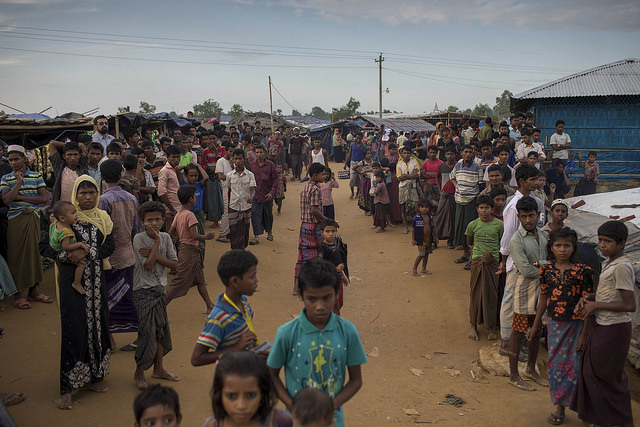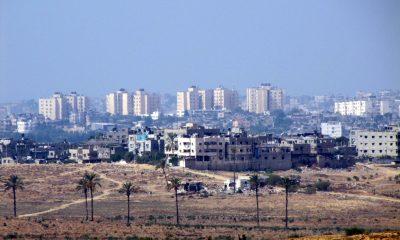News
Rohingya woman in Bangladesh helps others flee Myanmar

Zahida Begum doesn’t remember her home village, a tiny speck amid the mountains and forests of Myanmar. She was only 18 months old when her mother smuggled her across the Naf River on a fishing boat, carrying her into Bangladesh, among hundreds of thousands of Muslim Rohingya fleeing persecution in their home country. (Photo: European Commission DG ECHO/Flickr, CC BY-NC-ND 2.0)
KUTUPALONG, Bangladesh—Zahida Begum doesn’t remember her home village, a tiny speck amid the mountains and forests of Myanmar. She was only 18 months old when her mother smuggled her across the Naf River on a fishing boat, carrying her into Bangladesh, among hundreds of thousands of Muslim Rohingya fleeing persecution in their home country.
Begum has been a refugee ever since. She grew up in Bangladesh’s Rohingya refugee camps, and now earns a living working for a string of international aid groups. On quiet days, she’s the kind of person who wanders around looking for someone to help.
So when frantic relatives called her in late September to tell her that Myanmar soldiers were burning Rohingya villages and tens of thousands of Rohingya were fleeing, the 28-year-old jumped into action.
She made calls to a half-dozen countries. She raised thousands of dollars. She called in favours and arranged for boats and smugglers.
And one day later, some 400 people — including some of Begum’s relatives and other people from nearby villages — were safe.
“Had Zahida not sent those boats, we would have died in Myanmar,” said 35-year-old Abdul Matlab, one of the people rescued that night.
Matlab now lives in Bangladesh with his extended family in a small shelter of bamboo and plastic tarp where they sleep huddled together on the floor.
He said from his village alone, Begum saved 70 people. But about 400 others from the village were killed by Myanmar government forces, he said.
Begum, a smiling, self-confident woman in a long black cloak and headscarf, grew up listening to stories about the persecution of Rohingya in Myanmar’s Rakhine state, just across the Naf River.
Myanmar’s Rohingya have been called one of the world’s most persecuted minorities, a community of Muslims in a largely Buddhist country whose government refuses to recognize them as a lawful ethnic minority. Though some Rohingya families have lived in Myanmar for centuries, they are widely disparaged as illegal immigrants from Bangladesh.
Not long before she heard from her frantic relatives in Myanmar, Begum had heard about the start of “clearance operations” by the country’s security forces that eventually led to 618,000 Rohingya fleeing their homes and crossing the border into Bangladesh. The United Nations has said Myanmar’s actions appeared to be “ethnic cleansing.”
Begum knew she had to act quickly. There were mothers and children trying to flee. She remembered her mother’s stories of their own journey out of Myanmar in 1990, when more than 250,000 Rohingya fled to escape forced labour, rape and religious persecution.
Begum told the group she was in contact with that they should make their way toward the Naf River border and wait for more instructions.
“I called my brother-in-law, who lives abroad, and told him our brothers and sisters have arrived near the river, and asked him how we can bring them across to Bangladesh,” said Begum, who works as a translator and door-to-door health educator for aid and rights organizations including Human Rights Watch.
With the help of relatives in Australia and Malaysia, Begum said she raised more than $4,000 in a matter of hours. The money was wired to her through a shady middleman who charged a hefty fee.
She then contacted a fisherman in the Bangladeshi coastal village of Shamlapur, close to her home in the congested Kutupalong refugee camp, and asked him to hire two boats and set them off toward the Myanmar border.
Eventually, 70 families were brought out in the two boats, which had travelled more than 60 kilometres (100 miles) from Bangladesh to the pickup point in Myanmar, travelling through the Bay of Bengal and along the Naf River under the night sky. The smugglers charged more than $4,200.
Begum waited for the boats in Shamlapur, and first settled the new refugees around her own bamboo-and-tarp home. Eventually, she used what was left of the money, combined with more donations she had received, to give each family $35, then sent them to another refugee camp nearby to build their own shelters.
“If they are safe and healthy, I am content,” Begum said when asked why she decided to help. “Nothing makes me more happy than that.”





















